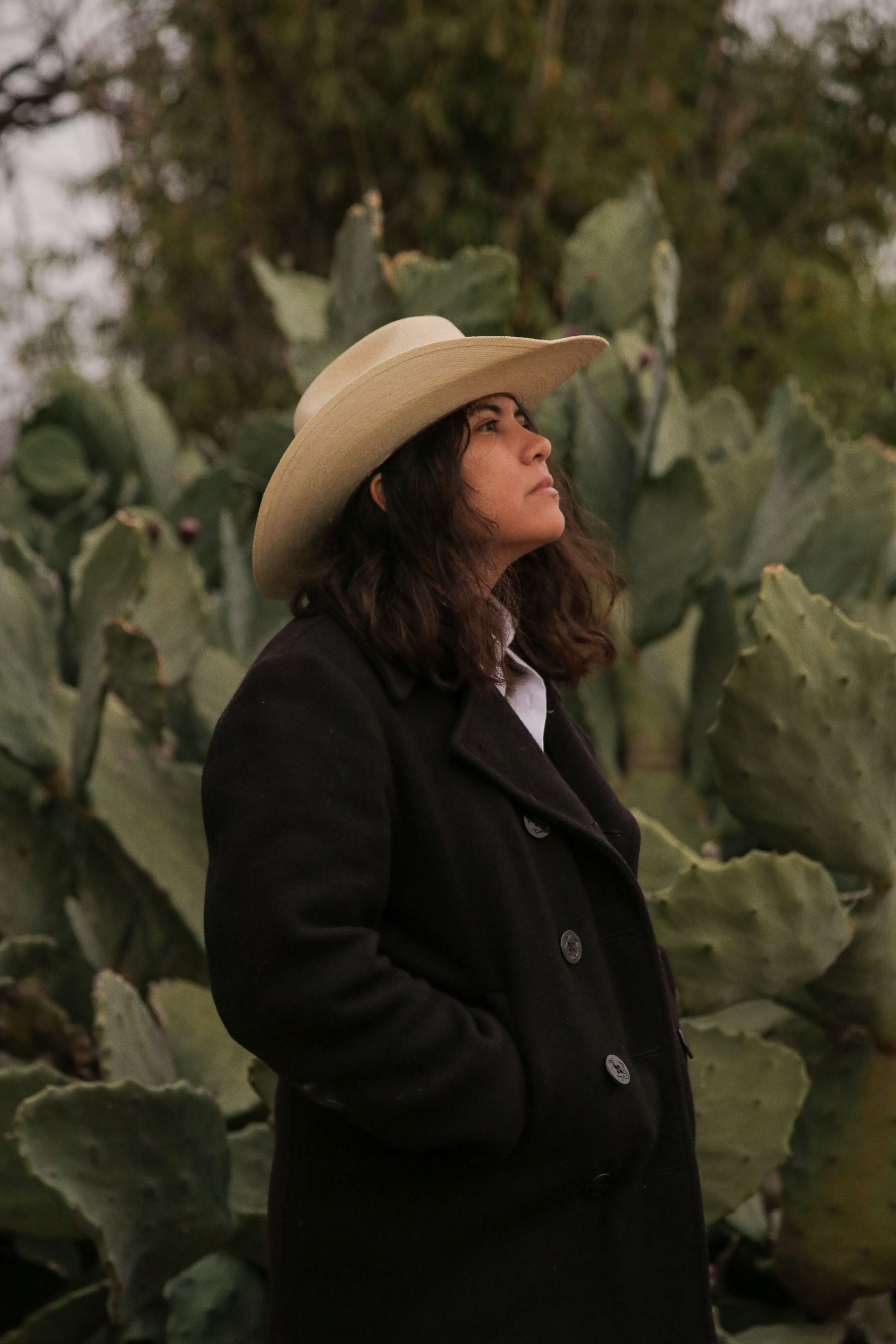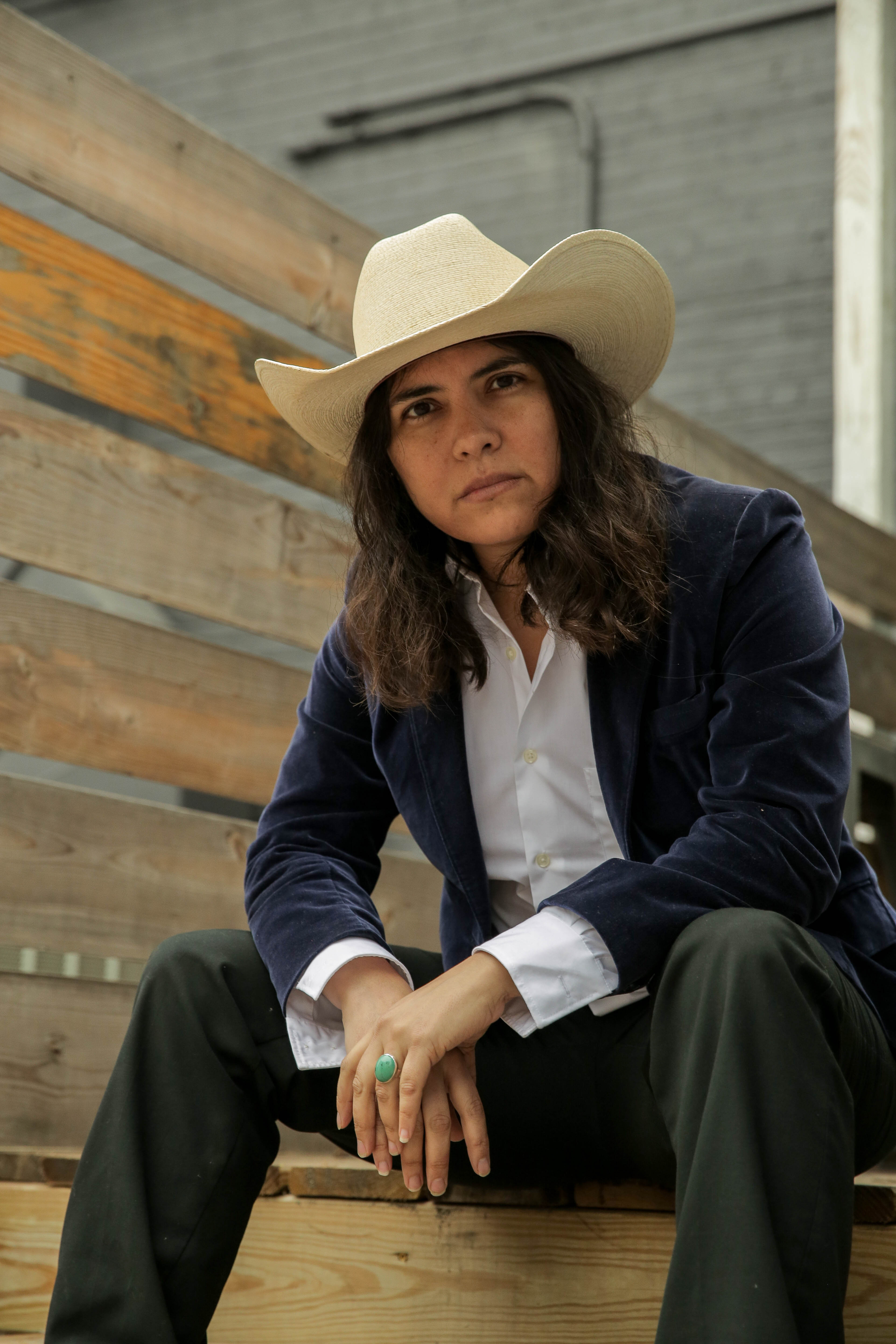Texas is a contested space. While it’s politically and socially connected to Mexico, it’s sometimes at odds with conservative Texan culture. Nearly 40 percent of the state’s population identifies as Latino, and the soon-to-be-majority of the state still contends with what it means to be from the land itself. If we wonder what the future holds for Texas, we can simply look to those who influence culture. But how does our current political situation – where anti-immigrant rhetoric runs high – affect the ideas and work of artists who live and work within this infamous southern state?
We turned to Austin-based writer Mónica Teresa Ortiz to learn more. Born and bred in the Texas panhandle, Ortiz offers a unique perspective as a queer poet and longtime cultural worker. Since 2012, Mónica has served as the poetry editor of Raspa Magazine, a biannual queer Latino literary magazine. Her first book, muted blood, debuted last year. Her writings have been featured in Huizache and the Texas Observer. In her work, Mónica incorporates the subject of death and rebirth while alluding to a queer futurity.
Her second book, autobiography of a semiromantic anarchist (Host Publications), dropped this week. We spoke to Mónica about her work, queerness, and our current political environment.
The following interview has been lightly edited and condensed for clarity.
How do you see Texas?
Texas is my home. I was born here, and it has the reputation that it is conservative, racist, homophobic, xenophobic, and tied to the old south. Is it deserved? Absolutely. If one looks at the formation of the state since it was colonized, and looks at our modern political theatre, absolutely we are all those things, historically and systematically. As much as we mythologize this place, it is important to be accurate and realistic about the development of that mythology and the way the state reproduces violence. I stay in Texas because I want to redefine its legacy and because I love this place. It is part of a reimagining of a New South that to me is queer, trans, black, brown, muslim. It’s marginalized people building futures over the ashes of the old South.

How does your upbringing influence your perspective?
I consider geography and space greatly influential in the way I think and relate to the world. I grew up post-Cold War through the development of neoliberalism and globalization, under Reagan, Bush, and Clinton. It was when American exceptionalism really gained traction, and one of the reasons I am adamant about being anti-imperialist is because as a child, I watched these things the US was doing to other places, on the other side of the world, and how we controlled so many narratives.
When 2016 came about and the election happened, I remember telling my partner at the time: “This pendejo is gonna win.” Racism isn’t limited by geography. Racism and the perpetuation of white supremacy is everywhere, rural or otherwise. It might manifest in other ways in cities or small towns and the way its produced and replicated might look different. I know people in Austin who have Obama or Beto O’Rourke bumper stickers, and they can be just as racist as people I grew up with. Racism is about power and white supremacy, so you notice these kinds of things more, the more you pay more attention to them because everyday you are confronted by them in policies, in architecture, zoning, educational and financial segregation.
Given your experience, how do you negotiate your own identity?
I don’t identify with Chicanismo or Latinidad. People can identify however they want, but for me, those terms don’t negotiate racial or ethnic identities or gender. I’m queer, and I’m Mexican, and I am from Texas, and I am from the panhandle. My dad is from the border. I lived on the border. But I approach the border as an outsider. We have different histories and identities. It’s very nuanced. I think Latinidad doesn’t quite explore those nuances.
And then of course, there is the issue of anti-blackness. We’ve seen a recent commercial surge from Black artists and film, and then there comes the Latinidad, asking, “But what about us?” Aside from its assumption of competition amongst our communities, there is also a sense that there aren’t Afro-Latino/as. Latinidad tends to codify it as a brown experience, and it’s really not. Black thought has had a tremendous impact on not just my work but is directly linked to the history of the Americas.
Then, there is the discrimination against Indigeneity. You can look at Yalitza Aparicio and the way white Mexicans have treated her. Someone like Yalitza threatens whiteness, and its power and privilege, and many benefit from that proximity to whiteness.
How is autobiography of a semiromantic anarchist different from your first book?
In my first book, I talk about my great-grandfather who was killed and no one knows where his body is. I asked my grandmother, and although she has an acute memory, they have no idea what happened to his body. It makes us ask to whom do our bodies belong to? Even though our bodies are there in the ground, instead of honoring those spaces, bodies get taken out, built over. Even when we are dead, our bodies are still possessions of the state. In my imagining of a queer futurity, that no longer is the case. We are liberated and we are free, but to get there we have to build it together.

What is your new book about?
My new book is a collection of cronicas. I was really influenced by Eduardo Galeano’s work and then began reading Cameroon scholar Achille Mbembe’s On the Postcolony. The cronicas reflect my exploration of necropolitics, of the state and sovereignty, of trying to exist and survive in a space where queerness is a disruption against heteronormativity, against heterosexuality, against whiteness, against the state which controls our lives, even what happens to our bodies after we die. I think it hinges on the concept of an afterlife.
When I came out to my parents, the person that they knew me to be, no longer existed. I was treated as if I had died. I began thinking, is my queerness my afterlife? Is it a rebirth? This is how I perceive queer futurity. As Jose Esteban Muñoz says, it is imagining a future that doesn’t exist yet. We live in a colonized space under capitalism. Our lives and deaths happen within these parameters. The settler-colonial state attempts to control how we experience love and loss and grief but it doesn’t have to define it.
How does your work comment on the current political situation in the US?
Towards the end of muted blood, I introduce the ideas of exodus and sanctuary. To me, it’s a very important question, because who is offered sanctuary in this country? I think the immigrants rights movement has become really big. In my neighborhood, I see a lot of signs in front yards claiming to be a ‘sanctuary for refugees and immigrants.’ But I always wonder, what ways do people actually practice this? I think about Claudia Rankine’s book, Citizen, and the micro-aggressions endured by the author. What is this actual idea of sanctuary and who does it apply to? Is sanctuary being offered to Black people, Black women, and queer and trans people in this country? If you say Black Lives Matter or bring up the topic of reparations, or condemn the actions of police departments, or even talk about displacement, people freak out. We’ve historically been pitted against each other and my work critiques that.

autobiography of a semiromantic anarchist is available now. You can purchase it online here starting Friday, March 22.
Editor’s Note: Itzel Alejandra Martinez, Remezcla’s photo editor, took the photos and video used in the article for Mónica Teresa Ortiz’s press kit.







